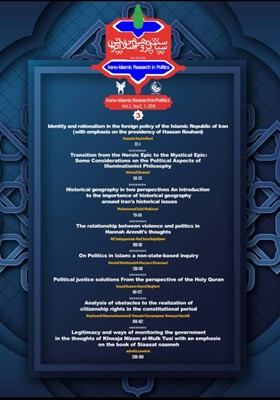Legitimacy and ways of monitoring the government in the thoughts of Khwaja Nizam al-Mulk Tusi with an emphasis on the book of Siaasat naameh
Subject Areas : Political Developments in Iran
1 - Department of Persian Language and Literature, Ahvaz Branch, Islamic Azad University, Ahvaz, Iran
Keywords: Power, Legitimacy, Khawaja Nizam al-Mulk, Siaasat-naameh, Supervision,
Abstract :
As one of the most successful ministers in Iran's political and social history, Khawaja Nizamul Molk has always been diligent in writing down his political thoughts and has also authored the book "Siaasat-naameh" based on his political actions. Based on this, in the present research, with a descriptive-analytical method and a library approach, and with an emphasis on the content of the policy book, we are looking for an answer to the question of what was the criterion of the legitimacy of the government in the thought of Khwaja Nizam al-Mulk and the strategies he devised to monitor the government. which are the results of the research show that although the political document is a text in the direction of legitimizing the government ruling the society, Khwaja Nizam al-Mulk's view of the government is significant by emphasizing the essential role of the king, whose legitimacy is based on God's choice. in the system designed by Khwaja Nizam al-Mulk; Both the designer and the executor and even the evaluation of the reviewers of the decisions taken by the system go back to one position and person, that is, the sovereign king, and some kind of structural and functional separation has not been done by Khwaja, although Khwaja tried by embedding the institution of the ministry in such a system between the spheres of Create a separation design and implementation. But due to many reasons, such as powerful royal-customary-religious traditions, elite competitions, historical setbacks in the political, cultural and security fields, etc., this work remained unfinished.
_||_


